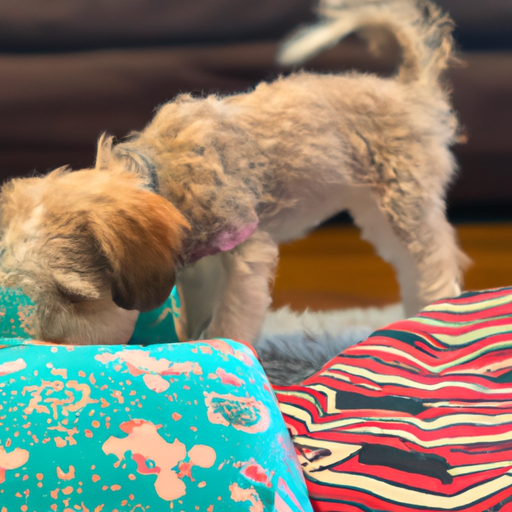Puppy pads, sometimes referred to as pee pads, are a training tool that can be used to teach your young dog where it’s appropriate to use the bathroom. They can be a lifesaver for new pet parents, especially those living in apartments or with limited outdoor space. But what is it that attracts puppies to these pads? Let’s delve deeper into this subject.
Understanding the Purpose of Puppy Pads
Puppy pads are essentially absorbent sheets that can be placed anywhere in your house. They are designed to attract your puppy to use them for their toilet needs. This attraction usually comes in the form of a scent that puppies associate with going to the bathroom.
Puppy pads are especially useful for:
- New puppies that haven’t yet been fully vaccinated and can’t go outside.
- Dogs living in apartments or houses without direct outdoor access.
- Older dogs who can’t hold their bladder for extended periods.
- Dogs recovering from surgery or illness.
The Science Behind the Attraction
The main reason puppies are attracted to puppy pads is due to the specific scent they are impregnated with. These pads are often treated with a synthetic pheromone that mimics the smell of a dog’s marking, which encourages puppies to relieve themselves on the pad rather than on your expensive carpet or hardwood floor.
Puppies have a natural instinct to pee or poop away from their living area. This is why they often seek out places like the corner of a room or behind a piece of furniture. Puppy pads, placed in these areas, attract the puppy and encourage them to use the pad instead.
Training Your Puppy to Use Puppy Pads
Training your puppy to use the pads can be a relatively easy process if you understand the principles of dog behavior.
Here are some steps you can follow:
- Place the pad in an appropriate area: This should be an area where your puppy has already shown a preference for doing their business.
- Encourage your puppy to sniff the pad: This will help them become familiar with the pad and the scent it emits.
- Reward your puppy for using the pad: Whenever your puppy uses the pad correctly, reward them with praise, a treat, or a favorite toy. This will help them associate using the pad with positive experiences.
Remember, patience is key. It will take time for your puppy to get used to using the pads.
Alternative to Puppy Pads
While puppy pads are a popular choice, they are not the only option for house training your puppy. Some alternatives include:
- Crate Training: This involves confining your puppy to a crate when you’re not able to supervise them. Dogs don’t like to soil their sleeping area, so they will hold it until they are let out.
- Outdoor Training: If you have easy access to a secure outdoor area, you can train your puppy to go outside right from the start.
Each method has its pros and cons, and the best choice depends on your individual circumstances and lifestyle.
Frequently Asked Questions (FAQs)
Here are some frequently asked questions about what attracts puppies to puppy pads:
Q: How long does it take for a puppy to get used to puppy pads?
A: This varies from puppy to puppy, but typically it can take a few weeks of consistent training.
Q: Can I use puppy pads and outdoor training simultaneously?
A: Yes, you can. It’s often recommended to transition from puppy pads to outdoor training once your puppy has been fully vaccinated.
Q: My puppy is chewing the puppy pads. What should I do?
A: Provide your puppy with appropriate chew toys. If the problem persists, you might need to reconsider the use of puppy pads or consult with a professional trainer.
Q: How should I dispose of used puppy pads?
A: Most puppy pads are disposable and can be thrown away in a regular trash bin. Always make sure to wash your hands thoroughly after handling used pads.
As a caregiver, understanding what attracts puppies to puppy pads can be instrumental in your house training journey. It’s a process that requires patience and consistency, but with time and persistence, your puppy will be able to master this important skill.



